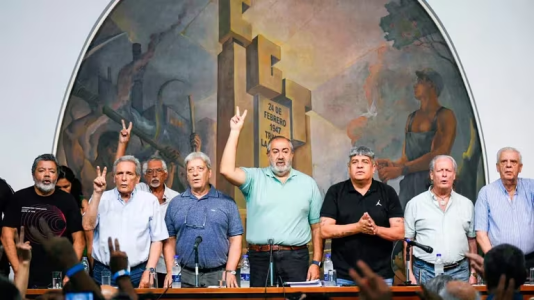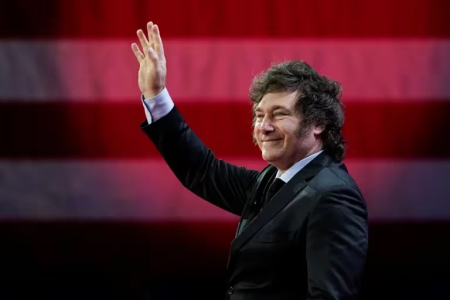The debate in the CGT deepens: why they delay a new protest and the key month that could accelerate the fight with Milei - Infobae

Source:

Se profundiza el debate en la CGT: por qué demoran una nueva protesta y el mes clave que podría acelerar la pelea con Milei
La dirigencia cegetista deliberará esta tarde en medio de una ola de conflictos salariales y laborales, aunque sin indicios claros de cómo seguirá el plan de lucha contra el Gobierno. La queja por la estrategia oficial que los somete al “desgaste” de los paros
February 29, 2024
The Cegetista leadership will deliberate this afternoon amid a wave of salary and labor conflicts, although without clear indications of how the plan to fight against the Government will continue. The complaint about the official strategy that subjects them to the “wear and tear” of the strikes
By Ricardo Carpena

The CGT measures the times of the protest and debates how to continue the fight against the government of Javier Milei
The small table of the CGT will resume its analysis and catharsis meetings this afternoon before a government of Javier Milei that unionism still cannot decode. The union leadership measures the times before launching a 24-hour general strike, but the prudence responds more than anything to the suspicion that, despite the consequences of the adjustment, there are no guarantees that a new measure of force will have a high compliance. That is why unionists look at the almanac: they believe that in April the peak of conflict will occur and it will be clear whether social tolerance of the Government will be maintained.
It will be the axis that will be on the table at the 3:00 p.m. meeting at the UPCN headquarters, in Moreno at 1330, which will mark the continuity of the debate that began last week in the Health Federation. The leadership of the CGT is more focused on letting each union try to unblock the salary and labor problems they have, aggravated in many cases because they cannot find interlocutors in the Casa Rosada. That is why forceful measures began to accumulate: La Fraternidad, Sanidad, the aeronautical workers, ATE and now the teachers with their strike on Monday and the UOCRA with the mobilization this Thursday before the Ministry of Labor for the layoffs.
To make matters worse, the same union members who say they are forced to stop complain that the Government, cunningly, allows the protests to take place without declaring mandatory conciliation, as was traditional, to stop the strikes and force negotiation. “These guys are lively: they don't declare conciliation and let us wear ourselves out with the strikes,” admitted an experienced leader.

Javier Milei's style baffles unionism (Photo REUTERS)
In the private sector, union members are struggling to review the joint ventures so that inflation does not continue to eat away at salaries, but in the case of the public sector there is added uncertainty due to the State reform that has begun to be implemented and that will reduce the sources of work. And, furthermore, the regret of the leaders is that they do not know who to talk to within the grid of officials to solve specific problems. “They don't give you ball. You have to call one and the other, they have many unfilled positions and they are not worried if you threaten them with a measure of force,” acknowledged a Cegetista leader.
Examples of this type accumulate. The three aeronautical unions that rejected the 12% increase announced that they had made progress in a possible agreement with Mauricio González Botto, Secretary of State Companies and Companies, but finally a call from the Minister of Economy, Luis Caputo, dynamited those auspicious negotiations and the “forced” to carry out this Wednesday's strike. The teaching unions met with the Secretary of Education, Carlos Torrendell, to make a proposal to avoid the strike, although they assure that the official did not give them any response and did not even commit to doing so. Now, the educational unions of the CGT, led by the Argentine Teachers' Union (UDA), of Sergio Romero, will stop on Monday, but the fear is the same: the wear and tear on society and their own bases due to the trap of protesting without obtaining solutions.
In the talks at the CGT small table, an obvious fact emerges that encourages them to wait a little: between March and April, the effect of the high rates and increases in food, fuels, schools and prepaid. “They are going to ask us on our knees to go on strike,” exaggerated a leader who has been leading his union for almost three decades.
Another union member, on the other hand, whispered something that he would never dare to say in front of a microphone: “If inflation goes down and people adapt to what is coming, I think we are going to have libertarians for a while.”
In public, once again, the voice that stands out is that of Pablo Moyano (Camioneros), the co-head of the CGT: “The President spends his time tweeting and pressuring the governors. Macri couldn't, much less this junk will be able to," he said this Wednesday, after the teachers confirmed the strike.
The CGT deepens its internal debate without many clues about the best path to follow. Its top leadership only seems to sense that the passing of the weeks will leave it closer to a general strike that, if the economy does not show improvements, no one will be able to describe as hasty or inopportune.

